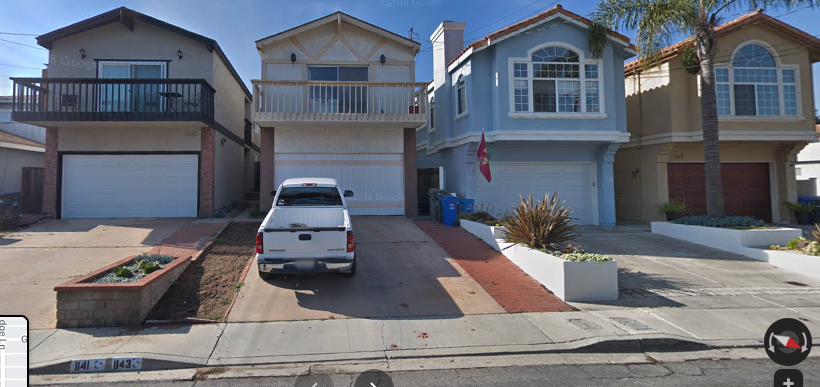(The above photo of Redondo Beach’s “Tall and Skinnies” shows how SB 9 and SB 10 would decimate yards and overrun single-family streets. But the dense 4-plexes in the photo above are half the density allowed by SB 9 and SB 10, which would jam 8 to 10 market-rate units on the lots depicted above, no yards, no garages.)
March 8, 2021
Bay Area and San Diego legislators are leading an attack on single-family zoning, reintroducing failed 2020 bills renamed SB 10 and SB 9. Bay Area legislator Scott Wiener repeatedly alludes to homeowners as elitists protecting yards and perpetuating redlining. He does not represent large areas of Black or Latino homeowners, and his ill-informed views threaten to force invasive urban renewal and market-rate density on Southern California and other highly diverse parts of the state.
In Los Angeles County alone, Black and Latino homeowners number in the millions and many have fought against redlining. Now, they must face developer-backed state legislators. In Greater L.A., 36 heavily Black, Latino/Black and Latino suburbs and urban areas house 1.4 million people, 45% of whom live in homes they own, the average ownership rate across L.A County.
If SB 9 and SB 10 become law, Greater L.A.’s most diverse working-class and middle-class homeowner areas will face an existential threat from developers, speculators and rental giants.
South L.A. has more than two dozen neighborhoods (L.A. Times “Mapping LA” data) with significant homeownership. The surrounding, highly diverse suburbs bring to at least 36 the number of cities and communities in Greater L.A. with substantial Black and Latino homeownership (L.A. Times “Mapping LA” Black Neighborhood List). As the below list is not exhaustive, the number is likely higher.
There is simply nothing like this breadth of homeowner diversity in Wiener’s district. In recent decades, market-rate density and low wages have driven many people of color out of San Francisco. Yet SoCal‘s vast Latino and Black homeowner areas are treated as non-existent by Wiener Inc. He slams homeowners as elites who take up space that Wiener thinks should contain 6-unit to10-unit market-rate rental projects without garages or yards for families. Few of the market-rate units produced by SB 9 and SB 10, if put on the market, would cost less than $620K. That’s the average price of homes sold in South L.A. in January of 2021 (Redfin).
[The below compilation is a project of volunteer urban planners and researchers at Livable California, livablecalifornia.org]
The Black, Latino and Latino/Black homeowner suburbs and communities of Greater LA
These 36 communities, well-located for speculators, investors and rental giants, face potential upheaval and demise under SB 9 and SB 10
| 1 | View Park-Windsor Hills (unincorporated) | Population 11K
87% Black Ownership: 75%
|
| 2 | Gramercy Park | Population 10K
86% Black Ownership: 70%
|
| 3 | Leimert Park | Population 12K
79% Black Ownership: 50%
|
| 4 | Manchester Square | Population 12K
78% Black Ownership: 57%
|
| 5 | Ladera Heights (unincorporated) | Population 7K
71% Black Ownership: 77%
|
| 6 | Baldwin Hills/Crenshaw | Population 30K
71% Black Ownership 31%
|
| 7 | Hyde Park | Population 37K
66% Black 27% Latino Ownership 51%
|
| 8 | Chesterfield Square | Population 6K
59% Black 37% Latino Ownership 51%
|
| 9 | West Compton (unincorporated) | Population 6K
58% Black 36% Latino Ownership 57.6%
|
| 10 | Athens (unincorporated) | Population 9K
54% Black 40% Latino Ownership 56%
|
| 11 | Harvard Park | Population 11K
Black: 48% Latino: 48% Ownership 51%
|
| 12 | Inglewood (a city) | Population 112K
Black: 46.4% Latino: 46% Ownership 37%
|
| 13 | Vermont Vista | Population 24K
Latino: 52% Black: 45% Ownership 44%
|
| 14 | Willowbrook (unincorporated) | Population 35K
Latino 53% Black: 44.3% Ownership 52%
|
| 15 | Green Meadows | Population 28K
Latino: 54% Black: 44.1% Ownership 49%
|
| 16 | Vermont Square | Population 46K
Latino: 56% Black: 39.2% Ownership 37%
|
| 17 | West Adams | Population 22K
Latino: 56% Black: 37.6% Ownership 37%
|
| 18 | Compton (a city) | Population 95K
Latino 57% Black, 39.8% Ownership 57%
|
| 19 | Downey (a city) | Population 108K
Latino: 58% White: 28% Ownership 52%
|
| 20 | Broadway-Manchester | Population 24K
Latino 59% Black: 39.3% Ownership 37%
|
| 21 | Vermont-Slauson | Population 27K
Latino 60% Black 36.8% Ownership 39%
|
| 22 | Watts | Population 37K
Latino 62% Black 37.1% 33% Ownership
|
| 23 | Norwalk (a city) | Population 104K
Latino 63% Ownership 66%
|
| 24 | South Whittier (unincorporated) | Population 56K
Latino 70% Ownership 65%
|
| 25 | Florence | Population 44K
Latino: 70% Black: 28.1% Ownership 35%
|
| 26 | Santa Fe Springs (a city) | Population 12K
Latino 72% Ownership 63%
|
| 27 | El Monte (a city) | Population 116K
Latino 73% Ownership 41%
|
| 28 | Paramount (a city) | Population 56K
Latino 73% Ownership 43%
|
| 29 | Montebello (a city) | Population 62K
Latino: 75% Ownership 48%
|
| 30 | Pico Rivera (a city) | Population 64K
Latino: 88% Ownership 70%
|
| 31
|
South Gate (a city) | Population 97K
Latino 92% Ownership 47%
|
| 32 | Commerce (a city) | Population 12K
Latino 94% Ownership 47%
|
| 33 | Lynwood (a city) | Population 70K
Latino 82% Ownership 47%
|
| 34 | Carson (a city) | Population 89K
Latino: 35% Asian 25% Black: 25% Ownership 78%
|
| 35 | Altadena (unincorporated) | Population 43K
White: 40% Black: 31% Ownership 75%
|
| 36 | Gardena | Population 59K
Latino: 32% Asian 27% Black: 25% Ownership 47%
|

